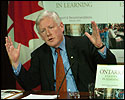Tuesday, February 08, 2005
POLITICS AS USUAL: THE RESULT? MORE "ANIMAL HOUSE" MOVIES
After months of research, public input and brainy deliberation, former NDP Premier Bob Rae has come out with his report on improving post-secondary education in Ontario. According to the Toronto Star, his $2.1B solution includes a number of initiatives, including:

"Alright, fine! I ruined the Province! So sue me!"
As the Toronto Sun reports, student groups were quick to denounce the plan:
"Bob Rae's recommendations are that if you are a middle-income family and you can't afford the tuition fee increase of 20% that it looks like he is calling for, and (if) you are ineligible for student loans, (then) he is actually making recommendations that student debt be transferred to the family debt through the family loan," said Jesse Greener of the CFS."
And for once, I agree with them. But not for the reasons you might think. I don't have a problem with tuition fees going up. I think it leads to more competition and a better school system.
Organizations like the Canadian Federation of Students (CFS) and other student groups have bemoaned any increase in tuition fees, claiming that the result will be a "U.S. style" post-secondary system where tuition runs about $40,000 US.
But does it? Not really.
While stated tuition does come close to that figure, many universities in the U.S. charge tuition based on the financial situation of the family. They also have created scholarships and other methods to make going to school more affordable.
In the FAQ section under the "financial aid" heading (hat tip to reader KMac), the Harvard University website states the following:
Does Harvard offer financial aid?
Yes. About 70% of Harvard students receive some form of financial aid -- grants, loans, and/or part-time work. Our program of need-based financial aid is designed to meet 100% of a family's demonstrated need. Our financial aid policies apply equally to international and U.S. citizens.
Which is interesting. But this FAQ is far more interesting:
Can students find jobs on or near campus?
Yes. There are always plenty of jobs available. We assist all students in securing part-time employment, should they choose to work during the academic year. Employment opportunities range from dining hall duties to work in the University libraries, laboratories, and offices. Students have also earned money on campus as bartenders, teaching assistants, sportswriters, computer programmers, lifeguards, and research assistants. Working on average six to eight hours per week, most students find that they can work, excel academically, and participate in a range of extracurricular activities.
Wow. Working while you go to school. What a concept. And considering the value of a degree from Harvard, the benefit clearly outweighs the cost (monetary or otherwise).
But what I do have a problem with is the double hit Rae is suggesting. On the one hand, he is stating that tuition fees should go up. Fair enough. On the other hand, he is advocating huge, mulit billion dollar investments in post secondary education. So while universites are allowed to charge higher fees, they still have the luxury of increased government investment from our tax dollars--even though only 50% of high school students go to university.
Sweet deal for them.
I also do not feel that post-secondary education is a "right". Its not. Its a privilege. And it should be treated as such. I think we all have seen what happens when something is deemed a "right": it loses almost all value as entitlement takes over.
In any event, Globe columnist Jeffrey Simpson has it right. Rae has given the FIBerals a golden opportunity to break another promise under the guise of following "expert advice": "Hey, we're just doing what the blue ribbon education panel told us to do".
Watch for them to break the "tuition freeze" promise, with or without the conditions Rae said were prerequisites for a tuition increase. I believe that will be Broken Promise #40 or so, but its hard to keep count.
- The enshrinement in legislation of the right of every "qualified" student to attend college or university regardless of means;
- A greatly enriched student loans and bursaries program, including full reimbursement of tuition fees for low-income students; and
- A major increase in government funding for colleges and universities to bring Ontario up to the Canadian average.

"Alright, fine! I ruined the Province! So sue me!"

As the Toronto Sun reports, student groups were quick to denounce the plan:
"Bob Rae's recommendations are that if you are a middle-income family and you can't afford the tuition fee increase of 20% that it looks like he is calling for, and (if) you are ineligible for student loans, (then) he is actually making recommendations that student debt be transferred to the family debt through the family loan," said Jesse Greener of the CFS."
And for once, I agree with them. But not for the reasons you might think. I don't have a problem with tuition fees going up. I think it leads to more competition and a better school system.
Organizations like the Canadian Federation of Students (CFS) and other student groups have bemoaned any increase in tuition fees, claiming that the result will be a "U.S. style" post-secondary system where tuition runs about $40,000 US.
But does it? Not really.
While stated tuition does come close to that figure, many universities in the U.S. charge tuition based on the financial situation of the family. They also have created scholarships and other methods to make going to school more affordable.
In the FAQ section under the "financial aid" heading (hat tip to reader KMac), the Harvard University website states the following:
Does Harvard offer financial aid?
Yes. About 70% of Harvard students receive some form of financial aid -- grants, loans, and/or part-time work. Our program of need-based financial aid is designed to meet 100% of a family's demonstrated need. Our financial aid policies apply equally to international and U.S. citizens.
Which is interesting. But this FAQ is far more interesting:
Can students find jobs on or near campus?
Yes. There are always plenty of jobs available. We assist all students in securing part-time employment, should they choose to work during the academic year. Employment opportunities range from dining hall duties to work in the University libraries, laboratories, and offices. Students have also earned money on campus as bartenders, teaching assistants, sportswriters, computer programmers, lifeguards, and research assistants. Working on average six to eight hours per week, most students find that they can work, excel academically, and participate in a range of extracurricular activities.
Wow. Working while you go to school. What a concept. And considering the value of a degree from Harvard, the benefit clearly outweighs the cost (monetary or otherwise).
But what I do have a problem with is the double hit Rae is suggesting. On the one hand, he is stating that tuition fees should go up. Fair enough. On the other hand, he is advocating huge, mulit billion dollar investments in post secondary education. So while universites are allowed to charge higher fees, they still have the luxury of increased government investment from our tax dollars--even though only 50% of high school students go to university.
Sweet deal for them.
I also do not feel that post-secondary education is a "right". Its not. Its a privilege. And it should be treated as such. I think we all have seen what happens when something is deemed a "right": it loses almost all value as entitlement takes over.
In any event, Globe columnist Jeffrey Simpson has it right. Rae has given the FIBerals a golden opportunity to break another promise under the guise of following "expert advice": "Hey, we're just doing what the blue ribbon education panel told us to do".
Watch for them to break the "tuition freeze" promise, with or without the conditions Rae said were prerequisites for a tuition increase. I believe that will be Broken Promise #40 or so, but its hard to keep count.
Subscribe to Comments [Atom]
 THE CONSERVATIVE HIPSTERS
THE CONSERVATIVE HIPSTERS












